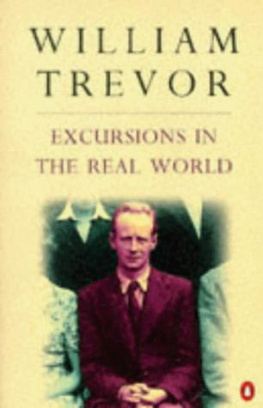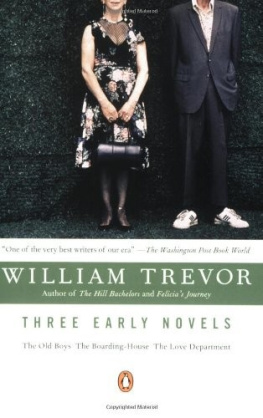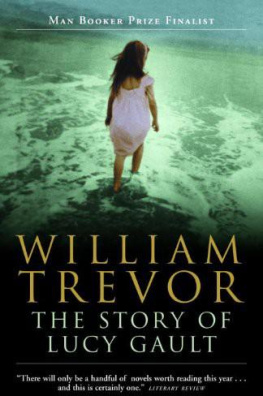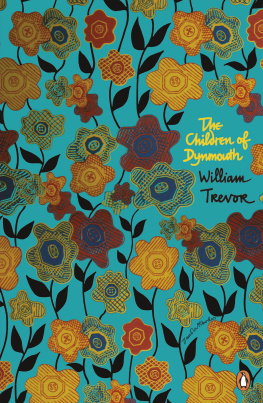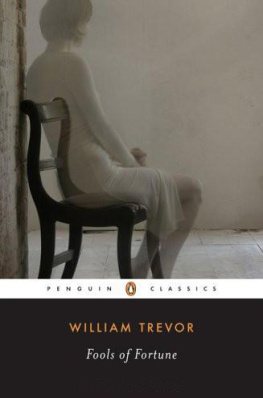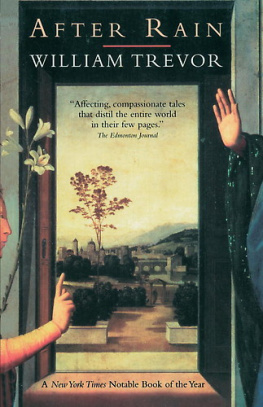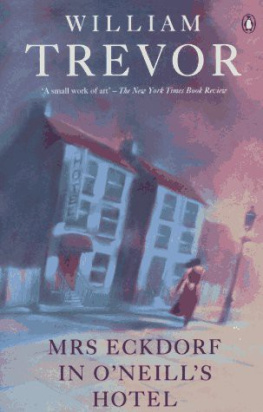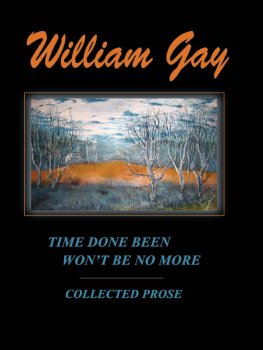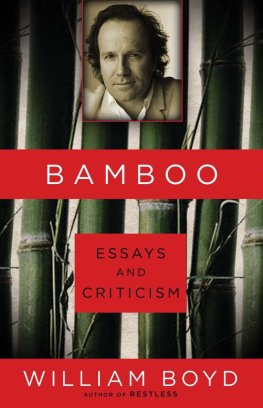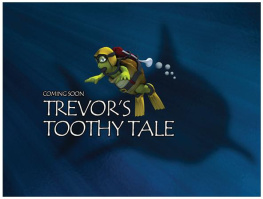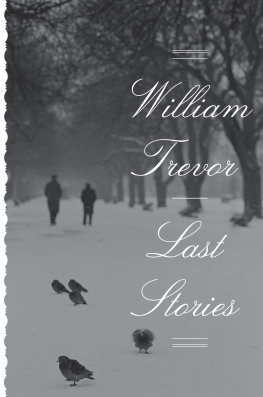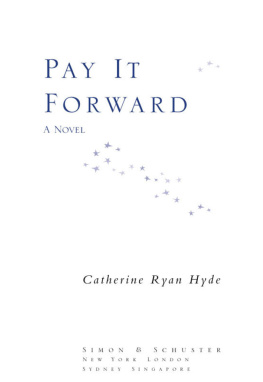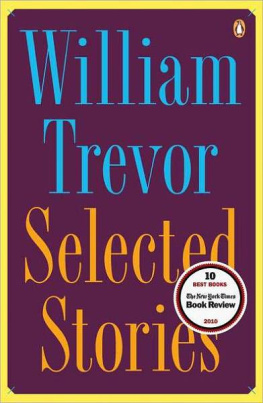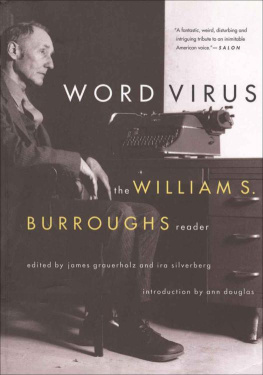

E X C U R S I O N S
IN THE
REAL WORLD
Memoirs
WILLIAM T R E V O R
with illustrations by Lucy Willis
PENGUIN BOOKS
P E N G U I N B O O K S
EXCURSIONS IN THE REAL W O R L D
William Trevor was born in Mitchelstown, County Cork, in 1928, and spent his childhood in provincial Ireland.
He attended a number of Irish schools and later Trinity College, Dublin. He is a member of the Irish Academy of Letters. Among his books are Mrs. Eckdorf in O'Neill'sHotel; The Children of Dynmouth and Fools of Fortune, both winners of the Whitbread Award; The News fromIreland; The Silence in the Garden, winner of the YorkshirePost Book of the Year Award; Family Sins; Two Lives (comprising the novels Reading Turgenev, shortlisted for the Booker Prize, and My House in Umbria, shortlisted for the Sunday Express Prize), which was named by TheNew York Times in 1991 as one of the ten best books of the year; The Collected Stories, named by The New YorkTimes Book Review as one of the best books of 1993; and Felicia's Journey. Many of his stories have appeared in TheNew Yorker and other magazines. He has also written plays for the stage, and for radio and television. In 1977
William Trevor was awarded an honorary Commander of the British Empire in recognition of his services to literature.
A C K N O W L E D G E M E N T S
Sometimes in a different form, a number of these essays first appeared in: Antaeus, Bad Trips (edited by Keath Fraser, Vintage Books), the Daily Telegraph, the Guardian, the Hudson Review, the Irish Times, the London Magazine, the New Statesman, the New Yorker, Nora, the Observer, the Oldie, Places (edited by Ronald Blythe, Oxford University Press), the Spectator. Ack-nowledgements are also made to the Lemon Tree Press and Virago.
C O N T E N T S
In County Cork I
The Strand 10
Kitty 14
Field of Battle 19
Miss Quirke 25
Bad Trip 29
The Bull 36
The Warden's Wife 41
Mentors 51
Long Stewart 58
Alma Mater 64
Visitors in Dublin 72
Summer, 1952 81
Blockley, Gloucestershire 94
A Public-House Man 99
Sarzy 107
Assia 114
Out of Season 122
To Persia in the Old Days 130
New York, 1973 139
In Search of Siri 147
The Valle Verzasca Sun 156
Journey to Suburbia 162
Eldorado 167
Extraordinary Ladies 173
In Their Own Shadows 178
Old Fusty 185
With Mr Links in Venice 189
The Nire 198
I N T R O D U C T I O N
THE SKETCHES HERE are of real people, almost all of whom are no longer alive. Some briefly encountered, others well known over many years, a few not met at all, these are people who for one reason or another have remained snagged in the memory. There have been others, of course, but naturally you have to draw the line.
Places do not die as people do, but they often change so fundamentally that little is left of what once they were. The landscape of the Nire Valley that spreads over a northern part of County Waterford is timeless, but the Dublin remembered here is the Dublin of several pasts, and elsewhere among these impressions there is that same dichotomy.
In any record of personal fascinations and enthusiasms, the recorder cannot remain entirely in the shadows, much as he might wish to do so. In the spring of 1992 the Guardian published a weekly series in which novelists from different countries wrote about who they were
or how they saw themselves in terms of their nationality. The following extract from what I myself contributed may serve as an introduction to the figure whose memory has been tapped in order to provide these forays from the territory of fiction into that of reality as it was.
Being Irish is complicated, in my case, by the fact that I am a writer of fiction. One circumstance influences the other: nationality seems irrelevant in the loose, uncharted world of art, then suddenly raises its voice; fiction insists on universality, then equally insists that a degree of parochialism can often best achieve this. A muddle of contradiction prevails, but since the practice of any art has to do with establishing order, muddles should be grist to the artistic mill. Or so at least you can pretend.
Writing is a professional activity, yet when fiction is the end product it must necessarily also be a personal one. As you engage in it, you cannot escape the person you are, even if you are not inquisitive about yourself and even though you instinctively know that the less your fingerprints blur your novels and stories the better. All fiction has its autobiographical roots in the sense that as a person you are your characters' litmus paper, their single link with reality. They taste as you taste, they hear as you hear. The blue they see is your blue, the pain they experience is your pain, their physical pleasure is what you know yourself. And the workings of memory you cull from yourself also.
His first memory was of a black iron gate, of his own hands uponit, and of his uncle driving through the gateway in a model-T Ford.
These images, and that of his uncle's bespectacled face perspiring, wereall in sunshine... He remembered also, at some later time, eatingtinned tomato soup in a house that was not the house of his aunt anduncle; he remembered a tap near a greenhouse; he remembered eatingan ice-cream outside Horgan's Picture House while his aunt engagedanother woman in conversation.
They are my memories too, but I am not the character in the story. The projection is a natural one because the town, and the incidents described, are to hand, and the period coincides. There's no point in rejecting reality just for the sake of it.
This bringing together of the person and the writer is an element in the professional's craft. A more fundamental one, and more difficult, is prising them apart in the first place. Born Irish, I observe the world through Irish sensibilities, take for granted an Irish way of doing things, am marked by small idiosyncrasies of behaviour and accent, and am reminded of familiarities of early environment when I'm separated from them. The bee-loud glade and the linnet's wings of Yeats's lament, the Mountains of Mourne sweeping down to the sea, are sweet nourishment for the exile. Sweeter still the aeroplane touching down at Dublin or Cork, the car crawling on to the quays at Rosslare. When the green jerseys swarm on to the pitch I will them passionately on. When an atrocity is an Irish one I am ashamed.
The writer's stance is different. He needs space and cool; sentiment is suspect. Awkward questions, posed to himself, are his stock-in-trade.
He attempts to extract an essence from the truth by turning it into what John Updike has called 'fiction's shapely lies'. To do so, he has to stand back so far that he finds himself beyond the pale, outside the society he comments upon in order to get a better view of it. Time, simply by passing, does not supply that distance: in my case, what was absorbed during my provincial childhood has long since germinated into raw material, but it is valueless in itself.
Next page
